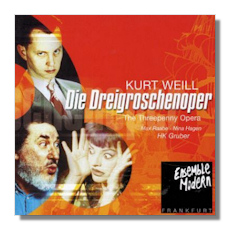
The Internet's Premier Classical Music Source
Related Links
- Weill Reviews
- Latest Reviews
- More Reviews
-
By Composer
-
Collections
DVD & Blu-ray
Books
Concert Reviews
Articles/Interviews
Software
Audio
Search Amazon
Recommended Links
Site News
 CD Review
CD Review
Kurt Weill

The Threepenny Opera
- Max Raabe (Macheath)
- Timna Brauer (Jenny)
- Sona MacDonald (Polly)
- HK Gruber (Peachum)
- Nina Hagen (Mrs. Peachum)
Ensemble Modern/HK "Nali" Gruber
RCA Victor Red Seal 74321-66133-2 DDD 2CDs 51:23, 31:00
We've needed a new digital version of The Threepenny Opera, and this one is quite satisfactory in many ways. The singing and characterizations are good, and the "pit band" – actually one of the world's finest new music ensembles – deserves star status. Furthermore, the recording is based on the new Kurt Weill Edition, which includes original stage music omitted on other recordings. Furthermore, librettist Bertolt Brecht wrote spoken material for a narrator in order to link the vocal numbers in concert performances of The Threepenny Opera; this is its first recording. The extra material is not exactly revolutionary, but it adds to our knowledge of the work, as does an interesting program note by Stephen Hinton, who worked with Edward Harsh to prepare this new edition.
For me, the greatest delights on this new recording are female. Nina Hagen was a punk diva of the late 70s and early 80s, and her blue-wigged Mrs. Peachum, which rapidly alternates between guttural croaks and pseudo-operatic shrieks, will not be to everyone's taste. I find it charming, in a grotesque sort of way – she's a bearded lady and a beaded dragon in a dress. Jenny and Polly are well contrasted, as is only right. As the former, Timna Brauer allows herself an occasional belt. She hasn't got as much character as Lotte Lenya (who does?), yet she gets within her role, and she sings the "Solomon Song" with telling ambivalence. As Polly, Sona MacDonald is more demure, but very much in the vein of Broadway. She has a lovely voice – pure, young-womanly, but not naïve. Her "Barbara Song" is one of this set's highlights. We don't get to hear much of Winnie Böwe's Lucy Brown. When we do, she makes a very positive impression. Her "poisoned gin" aria is done like Beethoven's Ah! perfido on crack cocaine, which probably is exactly what Weill and Brecht had in mind. (The original Lucy was a coloratura soprano, but she withdrew from the production because she thought it was immoral.)
The men don't have as much charisma as the women, but they acquit themselves well enough. Peachum is very capably sung by the Ensemble's conductor. Macheath is sung by Max Raabe; the booklet offers no biographical information about him (or anyone else in the cast), but I am assuming from the star billing that Germans know who he is. His tenorish Mack the Knife is suave and charming, almost mild-mannered, but with a malicious, knowing wink in his eye. He's not at all threatening, which I suppose is one way to play this role.
The extra material spreads this recording onto a second CD; I believe that BMG Classics has not passed the extra cost on to the buyer. The booklet contains the complete German text and a good English translation by Michael Feingold. I still would like to see Sony Classical reissue the Shakespeare Festival Production of The Threepenny Opera that starred Raul Julia and Blair Brown. It had some problems, but its Macheath, Polly, and Jenny were the most vivid English-speaking threesome on disc. This new Frankfurt-based recording is worth having, though, particularly if Lenya's recordings are a little too antiquated for you.
Copyright © 2000, Raymond Tuttle


















